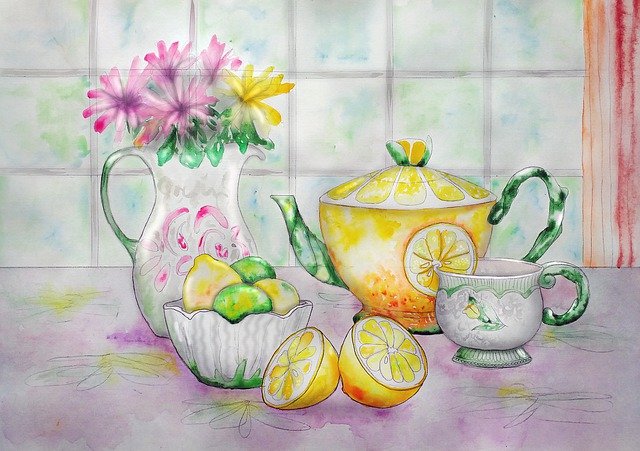Learning about the medicinal uses and benefits of flowers and plants has become my new passion. It grew out of concern for not only my own health and well-being but mainly the health and wellness of some of my children. Some of them do not like going to the doctor and prefer to search out natural remedies for whatever is ailing them.
Image credit
My late mother rarely went to see a doctor. She believed in herbal medicine and treated herself as much as she could before finally being persuaded to seek the advice of a medical professional. I have to say that many times her natural remedies really did work. Unfortunately, I did not pay attention to the various concoctions she used to mix when I was growing up, and so none of her knowledge was transferred to me.
When my children started strenuously objecting to visiting the doctor’s office and opted instead to find alternative health practitioners, I decided to do research. I started studying on my own because I wanted to know about the various remedies that were being suggested to my children. I say “children” as if they are minors, even though they are past 20 and 30 years of age. My late husband also began to use herbal remedies in addition to his prescribed medications for his health condition.
Please note that I am not a healthcare professional and when I speak about using these remedies I am only talking about my personal and family experience. You should always seek professional medical advice if you have an ailment. Don’t play guessing games with your health.
In this article, I want to share a summary of what I have learned about four (4) flowers or plants used for medicinal purposes:
gynostemma plant; and
sophora flower.
Honeysuckle flower
Many people grow honeysuckle flowers in their home garden because not only do they have a wonderful fragrance but they attract hummingbirds and butterflies. There are close to 200 different varieties, but the most common is the Japanese honeysuckle. This variety grows profusely in Japan and Korea. Other varieties grow in China, Europe, and North America. They remind me of the hibiscus flower because you can suck the sweet nectar from the tubes. Since the Middle Ages, people in Europe would eat the stems to treat dysentery, for infections in the upper respiratory tract. The ancient Chinese used honeysuckle for snake bites. Be careful which variety of honeysuckle you pick because some are edible and some are toxic. Botanists say the ones that grow in Europe are usually poisonous. You are also advised not to go by the taste. Sometimes the sweet tasting berries are toxic, and the berries that are not sweet are not toxic at all.
Who says watching TV for entertainment isn’t educational? The first time I ever heard the word “hawthorn” mentioned, I was watching a Korean drama about a vampire. They didn’t use crucifixes in Korea to repel vampires. They used hawthorn. Interesting huh? The hawthorn berry grows in Asia, Europe and North America. Good to know! Suppose you’re in Europe or North America but you get attacked by an Asian vampire. It’s just humor. On a more serious note, hawthorn berries have many health benefits. To name a few: they can lower your blood pressure, reduce blood fats, and treat digestive problems. Is it any wonder it is used with traditional Western medicine to treat heart failure? You can make a tea using the entire plant: the flowers, the dried berries, and the leaves.
This perennial plant has been called the “immortality herb” Some say it’s the “new ginseng”. Ginseng, as you probably know, is credited with making you strong, smart, and sexy. The gynostemma plant is a climbing vine that grows in southern China and other parts of Asia. It grows and grows and grows. The Chinese simply chew the leaves, serve them in a salad, or make tea to drink. Advocates claim that this plant can improve your cardiovascular health. They say it enhances the “yin” and supports the “yang”. In Vietnam, they are researching to determine if traditional medicine and Western medicine can be integrated, and this plant can be recommended in mainstream medical practice to treat diabetic patients.
The sophora flower is often used as a Chinese herbal remedy, and that’s why whole, dried flowers and the flower buds can be found in Asian markets. They treat headaches, high blood pressure, and even bleeding hemorrhoids. Be warned. It may be an effective herbal remedy but an overdose can prove fatal. Women who are pregnant or lactating should not that not take any medicines that contain the sophora flower. It’s also called the Japanese Pagoda Tree. Those who practice Western medicine are also familiar with this flower, but say that even though people use the flower for such ailments as hemorrhoids, menopause symptoms, and vomiting, there is no reliable scientific proof of its efficacy.
♦ What do these 4 flowers and plants have in common? When dried and combined, they can be used to make a medicinal tea that reduces your cholesterol. But, according to health experts, many other foods and drinks can lower cholesterol.
♦ RELATED LINKS:♦
Herbal Teas for Cholesterol Management: Know the Facts | Healthline
9 drinks that could help lower cholesterol | Medical News Today
10 Foods That Can Help Lower Your Cholesterol | AARP
♦ ♦ ♦














